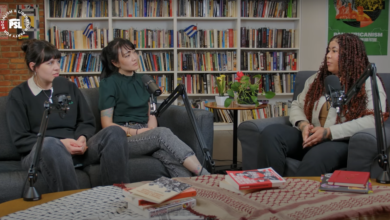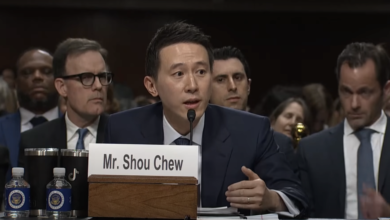 Photo: Stringer/USA |
For decades, Stewart has been one of the most prominent defenders of the persecuted and oppressed in the United States. Her conviction stems from her representation of Sheik Omar Abdel Rahman, an Egyptian cleric and leader of the Islamic Group, who was serving a life sentence in connection with the 1993 World Trade Center bombing.
The essence of the government’s case against Stewart consisted of nothing more than a June 2000 press release she issued on behalf of her client. The government claims the press release provided material support to terrorists and violated “special administrative measures.”
She is set to be sentenced in September 2005. Her right to travel is now limited to her home state of New York.
The legal and progressive communities have reacted strongly to the verdict in this case. Various prominent lawyers, retired judges and legal associations have condemned the verdict, saying it’s designed to kill the right of lawyers to vigorously defend unpopular clients and the right of clients to a full and fair defense. A network of local and national defense committees is now being established to defend Lynne Stewart while her conviction is on appeal.
Jim Lafferty, Executive Director of the National Lawyers Guild, Los Angeles, interviewed attorney Lynne Stewart for Socialism and Liberation magazine after Stewart’s recent unjust conviction for aiding terrorism
Can you describe the “special administrative measures” that you supposedly violated?
Basically, SAMs are prison regulations attached to prisoners that expand the ability of the Bureau of Prisons and U.S. Department of Justice to limit and monitor certain prisoners’ communications. SAMs really aren’t attached to lawyers, although lawyers do have to sign an affidavit stating that they will observe the SAMs.
The government can impose them against prisoners who they claim pose a risk of disclosing classified information or whose communications with other persons could result in death or serious bodily injury to others.
In my case, SAMs were imposed against my client, the Sheik. The regulations said, among other things, that a lawyer may be cut off from the client if he or she does not obey the SAMs. That means the lawyer would not able to visit them in a Bureau of Prisons facility.
When they were placed upon Sheik Omar—sometime mid-1997—Ramsey Clark was his appellate lawyer, I was on the team and others were also working on the case. We all signed these SAMs because that was the only way we could get to see our client.
What about the press release? It seems as though all you did was convey to the press something your client said about a cease-fire—whether it should continue, whether his followers should debate it.
That’s true. The charge that I violated the SAMs stems from a press release issued in 2000. The Sheik regularly receives mail from supporters in Egypt. Several letters asked him to comment on a cease-fire that had been in place in Egypt for three years.
The Sheik asked me if I would do a press release for him announcing his position on this. The Sheik’s position was that, although he was not in Egypt, he believed that the cease-fire should be open for discussion. That was the essence of this press release. But the government and the media chose to characterize it as a withdrawal of support for the peace initiative. They said it was a call to violence, which it wasn’t.
No shots were fired and no violent acts occurred as a result of the press release. And yet the government used that press release in order to convict me of aiding terrorism. Usually if one breaks a Bureau of Prisons edict, one is told one can’t visit the prison again, or one gets some sort of administrative slap on the wrist of some kind. One does not usually get indicted for aiding a terrorist organization.
It is the paradigm of our times, the way this government operates. They don’t care about what really happened, whether there is a real threat or whether we should really be frightened. The government just tells you to be afraid. They immediately say “it’s an orange alert.”
Why did you feel the need to issue the press release?
I needed to keep the case in the public eye. The First Amendment permits lawyers to speak to the press on their client’s behalf.
Recently, I received a letter from a lawyer in New Hampshire. He said that he didn’t understand what a press release has to do with representing one’s client. Some people don’t realize that representation is not just going into court, filing the paperwork, shaking hands with your client and meeting in the office. It encompasses a broad range of things. In our media-driven world, it certainly means speaking out for your client to the media if that person is a media object, and the Sheik certainly was.
The Sheik is a very important person on the world scene. The government was right about that. But he is not a commander in chief. He is not a director of military affairs. He is a religious leader.
The actual thrust of the press release was to open a dialogue and there was a clarification to make sure that was known. The Sheik’s opinion on the cease-fire was widely reported in the press in the Middle East, but not at all in the U.S. press, so it wasn’t a major earth-shaking thing. I issued the press release to keep the Sheik engaged, to keep him on the world stage.
As Ramsey Clark said in his testimony at my trial, we felt that it was our duty to the client. He had no chance of ever going home again if he was forgotten. We thought it was the least we could fight for.
 Protestors demand civil rights be defended against new right-wing attacks. Photo: Bill Hackwell |
I think it’s pretty clear. After the press release was issued in 2000, the government only wrote me a letter. There were press releases made on the case before that. I had a good faith basis to believe that this was allowable as part of my duties as a lawyer.
Things were much different by 2002. The government had launched a so-called “war on terror.” Part of that included going after the civil rights of people in the United States. But they had little to show for it. They needed a terrorist indictment and I was the best they could come up with.
I was arrested at my home in handcuffs and, later that night, former Attorney General Ashcroft went on nationwide television to praise the arrest of the terrorist grandmother from Brooklyn.
You were tried with two other co-defendants. Most of the evidence introduced against them had nothing to do with your case. Yet, you were tried in front of the same jury. The prosecutor also tried to connect Osama bin Laden to one of your co-defendants. Did this affect the jury?
When you put Osama bin Laden in a courtroom and ask the jury to ignore it, that’s asking a lot.
We fought over this with the judge tooth and nail because we understand the power of an image like that. But the judge allowed the prosecutor to play a video of Osama bin Laden at a convention to support Sheik Rahman. Apparently, bin Laden attended along with other people and someone on the video called for the release of Sheik Omar. This person had a tenuous relationship by telephone with one of the co-defendants. He had no connection with me.
The judge did tell the jury that Osama bin Laden had nothing to do with my case but the damage was already done. Once the image is in there, it becomes the focus.
It blinded the eyes of the jury as did the somewhat unspoken directive to march to the government’s tune. If the government tells you something is dangerous, if the government says convict these people—that they’re terrorists—then don’t ask questions, please do it. That is what the government has been putting out there since 9/11.
Even though the jury took three weeks to come to a verdict in my case, it was a strange verdict. I’ve never seen three members of the jury weeping openly in court during the entire rendition of the verdict. This happened when I was convicted.
We’ll never find out what took place in the jury room. It was a Manhattan jury, but they were not able to withstand the pressure coming from the government.
 |
Most people find this totally outrageous. Early on in the trial when they were introducing this evidence, I made the point—don’t ask yourself what I was saying in the conversations; ask what the government was doing listening in on conversations between an attorney and her client.
We’re talking about a visit in a federal prison in which the government put microphones in the room and installed a video camera. We later learned that agents sat in a little office down the hall and listened to an entire two-day visit. They listened to 12 hours of conversations between the interpreter, the Sheik and me.
It’s brutal when you think about it because attorneys and clients both rely on the confidentiality of these conversations, not for the purpose of secrecy or passing messages, but for the purpose of representing the client well. The client must be able to communicate with you without any fear of retribution. It is such a crucial right.
In speeches you’ve made since your conviction, you have said that the Bush administration’s attack on you is part of a much broader attack on every lawyer who represents unpopular clients. Will you comment on that?
The Bush administration is telling lawyers what they can say, what they can do and how well they can defend their clients. This is an attack on the Sixth Amendment, which says that everyone has a right to competent counsel.
I don’t think I was picked out for prosecution just because I’m a smart lawyer. I do think it rested a great deal on the nature of my clients and the fact that I have also in my own political life been an outspoken critic, since the Vietnam War, of the government and particularly of the injustices done to the Black community.
Of course, it is not what I do as a lawyer. What I do as a lawyer is represent clients. But I have been a thorn in the side of the government on many occasions when I’ve taken on political cases. I’ve represented numerous people who were innocent but had been singled out by the government. Now I’ve been singled out.
The government wanted to make a jury believe that who Lynne Stewart is in her everyday life—someone who stands up and demands accountability from the U.S. government—is just like the Sheik, who has been branded a terrorist. They succeeded by twisting the truth.
But this is not what this case is about. It’s an attack on the Sixth Amendment. It’s about lawyers representing clients.
The government is hacking away at these rights. They have tried desperately to keep people from having lawyers. We know about Guantánamo. People are being held without access to lawyers and without access to the witnesses and evidence being used against them.
What can people do to get involved with your case?
We’re calling upon people to spread the word about the case and what it means for everyone who seeks justice. People can write letters to the judge requesting leniency in sentencing. The judge has it within his power to not send me to jail and we want him to do that.
It is not over till its over. We are going to continue fighting on.
For more information on the case and to find out how to get involved in the campaign to defend Lynne Stewart go to http://www.lynnestewart.org.





